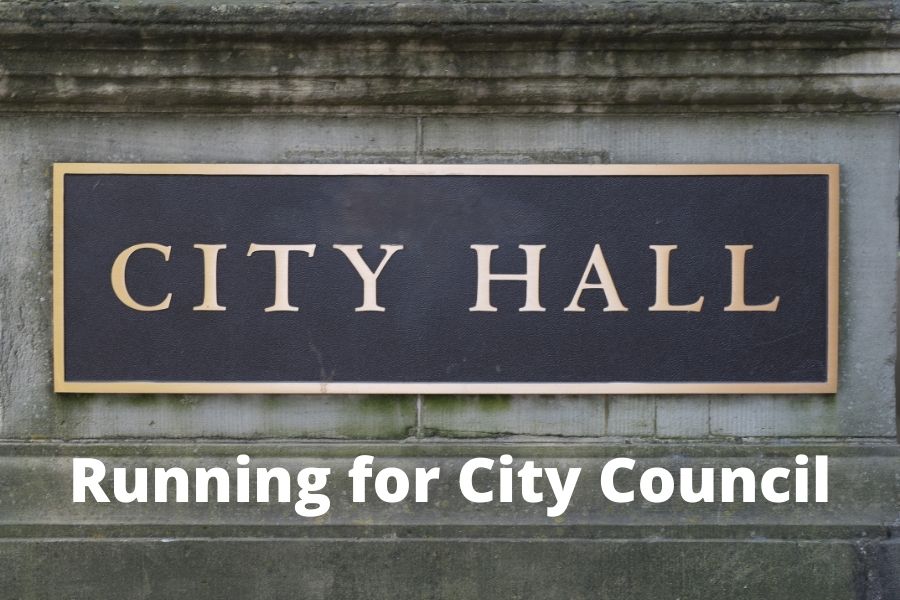A city council is a group of elected officials who serve as a city’s legislative body. It’s a popular position for first-time political candidates. So, if you run for a seat, you will likely face opposition.
For example, in 2021, over 300 candidates ran for New York City Council throughout the five boroughs. That is a lot of people running for just 51 elected positions.
Council members—also known as a city council or board of aldermen—are tasked with representing the interests of their constituents. The official titles vary. They may be called council member, alderman, selectman, trustee, freeholder or commissioner. In Chicago, for example, the city government consists of 50 aldermen elected from 50 wards.
Councilpersons are those who have been elected by their community to be a representative. They help people in their community with services and issues that may arise. One of the most important jobs of a council is to work closely with the administration of their city. They do this by dealing with local issues such as zoning, public transit, parks and recreation, public safety, and other issues relevant to their community.
Depending on local and state laws, a city council’s duties may include:
- Approving city budgets
- Proposing public and business laws and ordinances
- Passing and ratifying local laws and ordinances
- Updating the municipal charter
- Responding to constituent needs
- Regulating health and safety issues
- Investigating agencies, when necessary
- Serving as a check against the mayor
Most council members, including the mayor, are directly elected by voters in a city, district or parish. When running a city or town council campaign, there are things you need to know about eligibility, the issues, fundraising and establishing an effective team.
How to run a campaign for city council:
- Why you should consider running for city council?
- Check your eligibility to run
- Can you keep an existing elected position?
- How much money will you need raise?
- Increase your local popularity
- Find your endorsements
- Attend events and government meetings
- Create a campaign committee
- Register as a candidate
Why should you run for city council?
The role of a city councilperson is to provide leadership and support for their community. They work closely with the city’s administration. In most cases, they mainly deal with local issues such as zoning, public transit, parks and recreation, and public safety.
You do not have to be an expert in any specific field but you need to have a clear understanding of what each department does and how it impacts the community that they represent.
Have a clear goal before running for office. What are some of the challenges facing your town or city? What solutions would you provide to these problems? What makes you better than the other candidates?
You will find that there are many important community issues. Find out which solutions are being proposed to address them, and then figure out your own positions.
Analyze the demographics of the area, including the numbers, age ranges, household income and more. What are the dominant constituent groups? What are their needs and demands? When you understand the issues, your district, and your constituents, you can use that information to develop an election platform.
With this information, you can start to create an election strategy. This will include coming up with an overall theme and slogan to let voters know who you are and why you are running.
First, check your eligibility to run
Running for political office is not an easy thing to do. Many potential candidates have no idea how to get on city council. There are many steps that need to be taken, and it’s not always easy to figure out where to start.
Your local government sets the required qualifications for council positions. They vary across different areas so it’s best to be fully up-to-date on your local requirements before filing.
Council members typically serve four-year terms, though two-year terms are common in smaller municipalities. The length and number of terms that a member can serve can vary. In Los Angeles, members are elected for a four-year time period, for a maximum of three terms. In Dallas, the term for the council members is 2 years and they may serve up to 4 terms.
“When I grew up, and I think about City Council, I look at the men and women then – these were people who just wanted to be a part of the community and give something back. They weren’t necessarily trying to use it as a steppingstone to something else. I looked up to those people.” — Brad Wenstrup
Common requirements for locally elected officials:
- Age requirements. Generally, to be elected to office in a large US city, a person needs to be at least 18 years of age. This includes even large cities like New York City.
- Residency requirements. Most US cities require that candidates for public office reside in the district or parish where they are running. Candidates must also be registered to vote in the municipality where they campaign.
- Are there conflicts of interest? Cities may restrict your eligibility to run if you do regular business with them. For example, if you are a person who commonly petitions for city contracts or permits, you may not qualify to run.
How to begin your campaign
Your county elections board or city clerk can provide the requirements and rules for your election before you run.
Filling out proper paperwork is an important part of the process. You will need to make sure to have registration forms and any other relevant documentation you think might be necessary, just to be safe. Personal details such as name, age, education and work experience, residence and your financial interests must be provided.
There will be deadlines for submitting your documents. Filing fees may also be required. It is at this time that many local candidates launch their campaign website.
Can you keep your existing elected position?
Some cities require the candidates to resign from their existing elected position if they plan to serve in a local council. This is called “resign to law”. Five states currently have resign-to-run laws—Arizona, Florida, Georgia, Hawaii, and Texas. If you fall under this law, you will need to leave your current job before you can run for another office.
“A few years ago, the city council of Monza, Italy, barred pet owners from keeping goldfish in curved bowls … saying that it is cruel to keep a fish in a bowl with curved sides because, gazing out, the fish would have a distorted view of reality. But how do we know we have the true, undistorted picture of reality?” — Stephen Hawking

What will your city council campaign cost?
Campaigning for a local election can be a lot of work. This is especially true when you’re running for a village city council position. A candidate for this type of position may only need to raise a few thousand dollars and some door-to-door canvassing to gain the votes needed to win.
However, a large city race will require considerably more resources.
- Calculate the amount needed for your election before you begin fundraising. Election costs vary depending on the size of the city and competitiveness of the seat. The state board of elections provide financial disclosures, but it’s also wise to check the FEC records for estimations if you live in a large city.
- Many factors can affect the overall cost of a campaign. For example, if you are running against an entrenched incumbent, then you will likely need a bigger budget. Research the amount raised and spent by other candidates in the last few elections.
You can identify trends in election spending by looking back at the past and then put that intelligence into your own budget.
Increase your local popularity
Good messaging bonds you with voters. But to really build a following, don’t underestimate the power of raw popularity.
Many people will vote for a popular individual. We often see this in governor elections, where celebrities with no political experience sweep into office.
- Increase your popularity can be tough, especially if you are not extremely outgoing. Get in the know of local events by attending or doing research.
- Becoming an active community member can lead to leadership opportunities, especially if you take the time to attend council meetings.
- When meeting community leaders, try to meet them outside of the traditional setting of governmental meetings.
- Having elected officials and community leaders on your side will help you get endorsements and connections with other people who can support your campaign.
When you are running for a political office, start your outreach process early. Being known as a candidate makes people react differently. They will see you as someone running for office instead of just another person.
As the campaign progresses you should erect signage and other public displays that will increase your visibility to voters. Go door-to-door to reach out to people in different neighborhoods and offer a personal contact through canvassing. Online marketing is a great way to expand your reach.
“I enjoyed the administrative work because it involved working with Congress, city council, and the mayor. I had never been a politician so it was fun – learning political maneuvering.” – Harold H. Greene
Securing endorsements
Getting endorsed by politicians, political parties and other authorities can help establish trust with a good segment of the electorate. Organizations don’t seek out candidates to endorse, so you should be proactive when looking for endorsements. This is especially important for first-time candidates.
Most organizations require candidates to complete a questionnaire before they can be endorsed. It is not uncommon for these questionnaires to ask about the candidate’s policies and how those will benefit the organization or their objectives.

Reach out to organizations who might endorse you as a candidate.
Newspapers endorsements from the editorial board can be very helpful. Getting such endorsements can also help you get public support and influence voters.
Find additional endorsements from politicians, local parties, influential locals, local unions and community leaders. They can also raise your profile while making you more visible to the voting public.
Good endorsements will boost your fundraising and volunteer organizational abilities.
Attend events and board meetings
As an aspiring politician, it is crucial to attend events and local town and city board meetings. They will give you a platform to discuss issues with other politicians and let people know about your concerns.
Attending public meetings also gives you the benefit of meeting local representatives and developing an effective contact network.
Building contacts will be essential to your political career – now and in the future.
Connect with members of your community
Increase your influence with voters by having a meeting with the leaders of the community. This gives you an opportunity to discuss local issues that are important to them and also allow us to show some of our strengths as a candidate.
People like to be involved in the decision-making process. Give them an opportunity to participate and choose who they want as their representative.
Put together your political campaign committee
To run for office, you will need to form a campaign committee, appoint a treasurer, and open up an account with the bank. It is helpful if you can recruit others who have experience in how to run a campaign for city council.
A treasurer must be appointed before any spending, receiving of funds, or entering into agreements with other people. Technically, the candidate can act as their own treasurer, but this is not recommended.
Most cities require you to establish a committee before you declare your candidacy. Once established, your team will help in day-to-day operations.
Register as a candidate
You will need a required number of signatures to qualify to run for a council seat, and if you want to pass the election petition stage, you should start by collecting signatures.
The number of signatures required will vary depending on the population size and geography of your town or city. Your local municipal office can help specify the exact number of signatures you need. If you need help gathering signatures in a large city, you may want to hire canvassers or volunteers.
Once your petition has collected the required number of signatures, the next task is the candidate’s affidavit and fulfilling any other election requirements. There may also be filing fees.
If all goes well, you will find yourself on the ballot. Good luck!
“If the City Council wants to hold the police accountable, it has the subpoena power and oversight responsibility to do so. They don’t have the courage to do it.” — Sal Albanese

You’ll need to get enough signatures to get on the ballot.
Now that you have an idea what goes into launching a political campaign for council, now is the time to get started!
Featuring an affordable websites for campaigns, tools and marketing services, start your run with Online Candidate.
« How Candidates Fundraise for Political CampaignsUsing Facebook Live for Your Political Campaign »
Tags: city council








